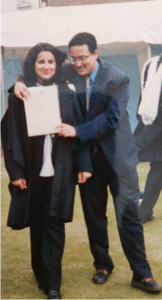
I have been a regular visitor to Pakistan for almost 2 years now and what have I learnt? Well many things. And unfortunately nothing pleasant. It pains me deeply to make that admission.
I am embarrassed when I recall my defence of Pakistan and all things Pakistani over two years ago. George Bernard Shaw said that “Islam is the best religion and the Muslims are the worst followers” and I would say the same of Pakistan – Pakistan is the best of countries but the Pakistanis are the worst citizens.
My brother Farooq, who was assassinated at Ramada by Wyndham in March 2022, had no illusions about Pakistanis but I suspect he focussed on the country and knew this country had to be dragged – kicking and screaming most likely – to develop its full potential.

One of the things I have learnt is that the Pakistanis of today don’t read and they refuse to read. Farooq once said most Pakistanis were “visual” people and in fact he tried to represent the Kashmiri issues through a comic to engage the youth. That effort garnered more interest in countries like Indonesia than Pakistan though the interference with his website by the Hindu extremists probably didn’t help.
When I first arrived in Pakistan, it took me a long time to grasp the “can’t read, won’t read” mentality. I now remember when the ICT SHO Qurban Ali Anwer – currently on trial for complicity in my brother’s murder – gave me an email address but never responded to the emails. It was the same with every police officer including the Inspector Generals (IGs). It reminded me of the time when we would send articles to the main Pakistani newspaper editors and they would never reply. Even now, the same things happen – many email addresses but not one single reply. They have email addresses because I’m sure it’s fashionable to have one but they don’t use them – I suspect that means they would have to read!
I recall meeting IG Ahsan Younas of ICT police on 30th April 2022 – he’d promised an investigation which was soon reneged on by his successor IG Akbar Nasir Khan. This IG is a “Chevening Scholar” which are given by the British – such is their generosity. I could not possibly imagine that they would have any ulterior motives in supporting scholarships in Pakistan. And yes, for those who don’t understand British humour, I am being sarcastic. Ahsan Younas called his SSP of Investigations Syed Karrar Hussain who made notes in the presence of his boss and was told to meet us the following day and progress the investigation.
So we travelled again to Islamabad on 1st May 2022. This time there were no notes taken – SSP Karrar could barely contain his boredom. He played videos on his phone whilst I tried to talk – I had to stop several times and look at him pointedly but I suspect the subtlety was lost on him. He kept saying “Keep it short! One page only!” We gave him a very brief written summary and the CCTV screenshots of the suspicious activity outside my brother’s hotel room at Ramada by Wyndham – this was 10 pages long with most of it in pictures. He looked aghast – “I don’t have time to read this!” was his reply. A murder investigation but the SSP of Investigations won’t read? It was bizarre to me at the time.
But his behaviour is far from an isolated example. Pretty much whoever we have met cannot handle reading or paying attention to key details. They say “Got it! Got it!” but then ask a question that was answered several minutes earlier requiring repetition. You can send documents and they’ll never read them. In the Sessions court of Judge Tahir Sipra in September 2022, I was told that my statement – which was to describe facts of the case – needed to be short. How can you remove facts on which a decision will be made? The Judge then walked out of the court room! It was hardly a Judge upholding the principles of the justice system. Needless to say that Sipra refused the private complaint – an action that had to be overturned in the High Court where he was found to have “erred in law”. There’s another incident recently from the Sessions Court of Sikander Khan – the State Prosecutor claimed she was ready to argue but when the Judge asked her if she’d read the file, she replied “no”. It would be funny if the matter wasn’t so serious. I guess I can at least commend her honesty that she admitted she hadn’t read it.
Of course I am generalising – there are a few exceptions but really very few. The “can’t read, won’t read” is not limited to a subset of Pakistanis. The behaviour is similar across genders, across clans, across educational status and across “classes”. It’s hugely problematic not least because the issue has been compounded by social media like Facebook and TikTok. Attention spans that seemed already low subjected to a barrage of pictures with no content. A Facebook post inspires comments of simply “mashallah”. And this has been tested – put any amount of writing and guaranteed that most don’t read to the end. A journalist did this a few months ago with a post about leaving Kashmir – at the end he admitted he wasn’t – but almost every single comment simply congratulated him!
I was struck even when I used to come to Pakistan in the past – yes technology is changing but where are the libraries and book shops? Go to the West and although some towns in the UK are facing financial issues, there’s a library. There are bookshops on every high street. Why are people even the supposedly educated ones unable to concentrate and read beyond a few paragraphs? Reading is so key to understanding, rationalising, developing new thoughts, arguments and ideas which allow challenging the status quo that there needs to be an urgent remedy to this disease in Pakistan.
—–
Dr Rehiana Ali is a Cambridge-educated Consultant Neurologist and has a PhD from Imperial College London. Her beloved brother Farooq, a Biochemistry postgraduate of Imperial College London, was a Patriotic Pakistani-Kashmiri and a freelance journalist and political intellectual. He was allegedly assassinated at Ramada by Wyndham on 11 – 12th March 2022 – the case is currently at the Sessions Court in West Islamabad. The social media campaign led by her sister Yasmin can be followed @Justice4Farooq
——-
Views expressed in this Op-ed and following reader comments do not necessarily reflect the views and policies of the TLTP.






You have analysed Pakistani society quite accurately. You can take the horse to the stream and might even perhaps take the stream to the horse but….this horse will still not drink.